|

by Prof Michel Chossudovsky
August 20, 2018
from
GlobalResearch Website
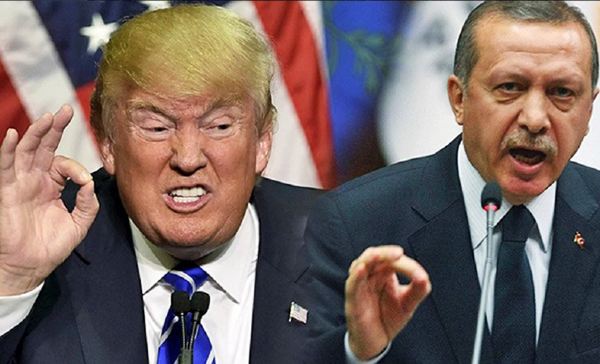
A major and far-reaching shift in military alliances is unfolding.
While Turkey is still "officially" a member of NATO, president
Recep Tayyip Erdoğan has been developing "friendly relations"
with two of America's staunchest enemies, namely Iran and Russia.
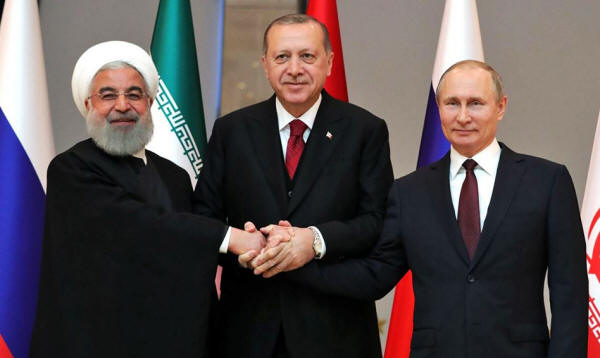
U.S.-Turkey military cooperation (including U.S. air force bases in
Turkey) dates back to the Cold War.
Today Turkey is
sleeping with the enemy. And Trump has ("rhetorically")
declared war on Turkey.
We are ready for war, says President Erdogan.
"The secret to
successful states is their readiness for war. We are ready with
everything we have," Erdogan's statement on August 12, meeting
with ambassadors in Ankara.
Erdogan also accuses the
U.S. of waging a "financial warfare" against Turkey.
Turkish banks are under attack. In turn, a banking crisis is
unfolding in the European Union largely hitting EU banks which hold
substantial portions of Turkey's debt.
According to Turkey's president:
"It is everyone's
observation that the developments in foreign currency exchange
have no financial basis and they are an attack on our country…
On the one hand you
are a strategic ally and the other you shoot (the country) in
the foot. Is something like this acceptable?"
Ahvalnews
While the media has its
eyes riveted on the collapse of the Turkish Lira (which so far in
2018 has lost approximately 40 percent of its value in relation to
the U.S. dollar), NATO is in a state of disarray, with one of its
member states "at war" with another member state, namely the United
States of America.
Turkey by a long shot has the largest conventional forces (after the
U.S.) within NATO outpacing France, Britain and Germany, (not to
mention its tactical B61 nuclear weapons capabilities).
#NATOExit
Broadly speaking, the U.S.-Turkey rift and its implications for the
Atlantic Alliance are either ignored or trivialized by the media.
The entire structure of
military alliances is defunct. NATO is in a shambles.
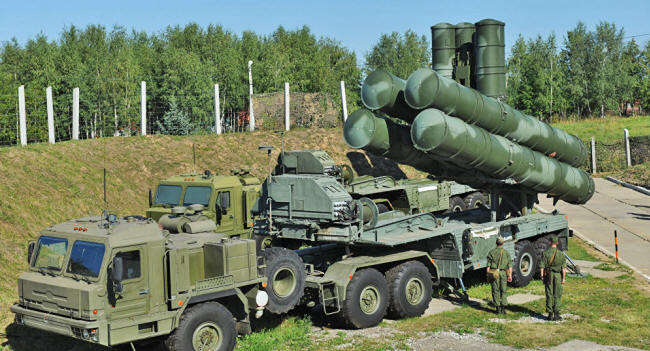
Turkey is to acquire Russia's state of the art S-400 air defense
system (above image).
Why? Does this mean that
Turkey which is a NATO member state will withdraw from the
integrated U.S.-NATO-Israel air defense system?
Such a decision is
tantamount to NATOExit.
"On July 26, the U.S.
Congress decided to ban the shipment of F-35 aircraft to Turkey
unless Ankara refused to purchase S-400 anti-aircraft systems
from Russia."
Pravda
The
U.S.-Turkey-Israel "Triple Alliance" is Also Defunct
In 1993, Israel and Turkey signed a Memorandum of Understanding
leading to the creation of (Israeli-Turkish) "joint committees" to
handle so-called regional threats.
Under the terms of the
Memorandum, Turkey and Israel agreed,
"to cooperate in
gathering intelligence on Syria, Iran, and Iraq and to meet
regularly to share assessments pertaining to terrorism and these
countries' military capabilities."
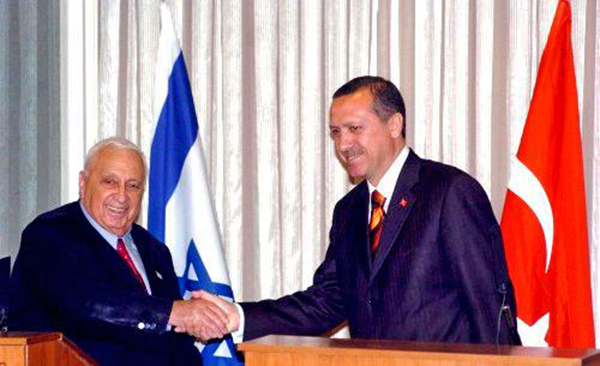
Sharon and Erdogan in 2004
The triple alliance was also coupled with a 2005 NATO-Israeli
military cooperation agreement which included,
"many areas of common
interest, such as the fight against terrorism and joint military
exercises."
These military
cooperation ties with NATO were viewed by the Israeli military as a
means to,
"enhance Israel's
deterrence capability regarding potential enemies threatening
it, mainly Iran and Syria."
The "triple alliance"
linking the U.S., Israel and Turkey was coordinated by the U.S.
Joint Chiefs of Staff.
It was an integrated and
coordinated military command structure pertaining to the broader
Middle East. It was based on close bilateral U.S. military ties
respectively with Israel and Turkey, coupled with a strong bilateral
military relationship between Tel Aviv and Ankara.
In this regard, Israel
and Turkey have been close partners with the U.S. in planned aerial
attacks on Iran since 2005. (See Michel Chossudovsky, May 2005)
Needless to say, that triple alliance is defunct. With Turkey siding
with Iran and Russia, it would be "suicide" for U.S.-Israel to even
consider waging aerial attacks on Iran.
Moreover, the NATO-Israel 2005 military cooperation agreement which
relied heavily on the role of Turkey is dysfunctional.
What this means is that U.S.-Israeli threats directed against Iran
are no longer supported by Turkey which has entered into an alliance
of convenience with Iran.
The broader
Realignment of Military alliances
The shift in military alliances is not limited to Turkey.
Following the rift
between Qatar and Saudi Arabia, the Gulf Cooperation Council
(GCC) is in disarray with Qatar siding with Iran and Turkey against
Saudi Arabia and the UAE.
Qatar is of utmost
strategic significance because it shares with Iran the world's
largest maritime gas fields in the Persian Gulf. (map below)
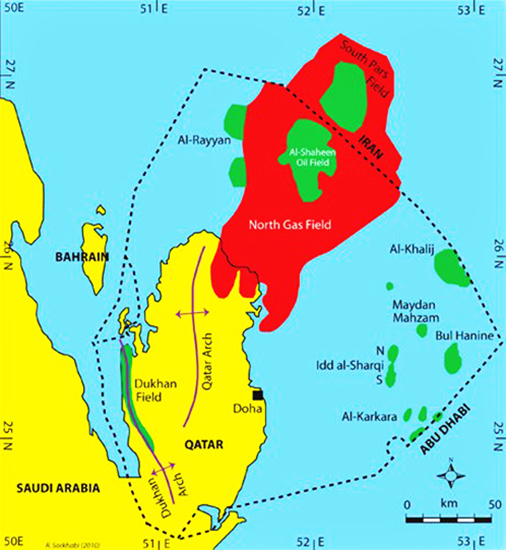
The Al-Udeid military base near Doha is America's largest military
base in the Middle East. In turn, Turkey has now established its own
military facility in Qatar.
The Shanghai
Cooperation Organization (SCO)
A profound shift in geopolitical alliances is also occurring in
South Asia with the instatement in 2017 of both India and Pakistan
as full members of the Shanghai Cooperation Organization (SCO).
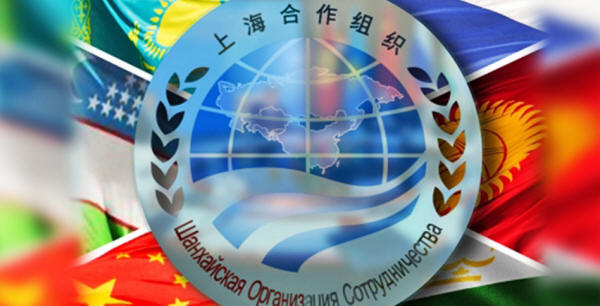
Inevitably, this historic
shift constitutes a blow against Washington, which has defense and
trade agreements with both Pakistan and India.
"While India remains
firmly aligned with Washington, America's political stranglehold
on Pakistan (through military and intelligence agreements) has
been weakened as a result of Pakistan's trade and investment
deals with China."
Michel Chossudovsky, August 1, 2017
In other words, this
enlargement of the SCO weakens America's hegemonic ambitions in both
South Asia and the broader Eurasian region.
It has a bearing on
energy pipeline routes, transport corridors, borders and mutual
security and maritime rights. Pakistan is the gateway to Afghanistan
and Central Asia, where U.S. influence has been weakened to the
benefit of China, Iran and Turkey.
China is involved in
major investments in mining, not to mention the development of
transport routes which seek the integration of Afghanistan into
Western China.
Where does Turkey fit in?
Turkey is increasingly
part of the Eurasian project dominated by China and Russia. In 2017,
Erdogan had several meetings with both president Xi-Jingping
and Vladimir Putin.
Erdogan has been
contemplating becoming a member of the SCO since 2016 but so far
nothing concrete has emerged.
|







